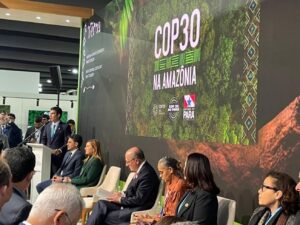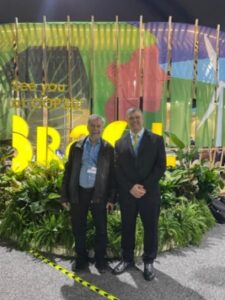This international event is an opportunity to showcase Brazil’s contributions to research that promotes sustainable practices
Prof. Carlos Eduardo Cerri, Director of the Center for Carbon Research in Tropical Agriculture at the University of São Paulo (CCARBON/USP) and Professor at the Luiz de Queiroz College of Agriculture (Esalq/USP), represented the center and the university at the 29th Conference of the Parties (COP29) in Baku, Azerbaijan.
The COP is the main decision-making body of the United Nations Framework Convention on Climate Change, also known as the UNFCCC. All countries that are Parties to the Convention participate in the COP, where they assess how the Convention is being implemented and review other legal instruments that may be adopted. During the COP, essential decisions are made to ensure the effective implementation of the Convention, including the necessary institutional and administrative measures.
The conference is held annually and has the task of reviewing the national communications and emission inventories submitted by the participating countries. Based on this information, the COP evaluates the effects of the actions taken by each country and the progress toward the Convention’s ultimate goal.
Representing CCARBON/USP, Prof. Cerri had the opportunity to discuss adaptation and mitigation issues for the agricultural sector with researchers from the Inter-American Institute for Cooperation on Agriculture (IICA).
Curt Delie, IICA Representative for the Caribbean region; Muhammad Ibrahim, IICA Director of Technical Cooperation; Carlos Eduardo Cerri, Director of CCARBON/USP; Prof. Dr. Rattan Lal, Ohio State University; Dr. Francisco Fujita de Castro Mello, International Specialist on Agriculture and Climate Change at IICA.
“The agricultural sector, in addition to being able to contribute by reducing its emissions, is the only sector that can make a fundamental contribution to climate change mitigation, acting as a net carbon sink.”
– Carlos Eduardo Cerri, diretor do CCARBON/USP
Prof. Cerri also participated in the international discussion at the “Save Soil” Pavilion, where he delivered a lecture on the carbon sequestration potential in soil through the adoption of regenerative practices in Brazil’s agricultural sector.
Carlos Eduardo Cerri, CCARBON/USP’s diretor, at Save Soil Pavilion – COP29, Baku, Azerbaijan
Through its representative, CCARBON/USP also attended the launch of the Brazil Pavilion at COP29 and held specific meetings with national authorities.
“This engagement is crucial to reinforce the center’s relevance on the national stage, highlighting its technical and scientific collaboration on critical agricultural topics in the face of climate issues.”
– Carlos Eduardo Cerri, diretor do CCARBON/USP
Prof. Cerri also participated in the preparations for COP30, which will be held in Belém, Pará – Brazil, in 2025.


On the left, national authorities; and on the right, representatives from academic and research institutions, Paulo Artacho from the USP Institute of Physics and Carlos Cerri, Director of CCARBON/USP
Present at the event were Vice President Geraldo Alckmin, the Governor of Pará State, Helder Barbalho, Brazil’s Minister of the Environment and Climate Change, Marina Silva, the Minister of Agrarian Development and Family Farming, Paulo Teixeira, representatives from the Civil House, senators, deputies, as well as civil society representatives and academic and research institutions, including Prof. Paulo Artacho from the USP Institute of Physics.
On November 13, the third day of COP29, Brazil launched its second Nationally Determined Contribution (NDC).
NDCs represent each country’s efforts to reduce emissions and adapt to the impacts of climate change. The Paris Agreement (Article 4, paragraph 2) requires each country to prepare, communicate, and maintain its NDCs, with targets they intend to achieve. To do so, countries must adopt internal mitigation measures to meet these goals.
“The first NDC launched by Brazil was submitted in the Paris Agreement, and now the second includes an ambitious target of a 67% emissions reduction by 2035.”
– Carlos Eduardo Cerri, diretor do CCARBON/USP
With these actions, the goal is to achieve, by the second half of this century, a balance between emissions from human activities and the removal of Greenhouse Gases (GHGs) by sinks.
CCARBON/USP’s participation in COP29 reinforces its commitment to sustainability and scientific leadership in addressing global climate challenges.
As an important research and innovation center, CCARBON/USP contributes with scientific data and proposed solutions focused on climate change adaptation and mitigation, particularly in the agricultural sector, which is crucial for Brazil and other tropical countries. At COP29, its presence not only strengthens the dialogue between academia and public policy but also highlights Brazil’s ability to collaborate technically in the search for more sustainable practices.









